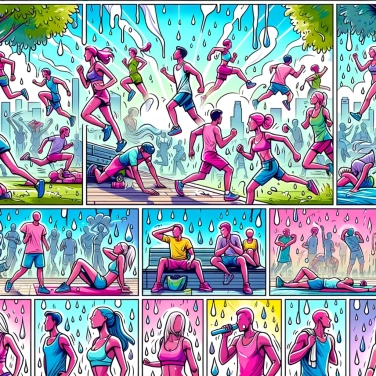We sweat to regulate our body temperature. When we are hot, the sweat glands produce sweat that evaporates from the skin, which helps to cool us down.

Sweating is a natural phenomenon that allows the body to release some of its internal heat and regulate its temperature, mainly when it heats up during physical exertion or due to external temperature. When we sweat, specific glands on the skin – sweat glands – produce a liquid primarily composed of water and small amounts of minerals. This water then evaporates at the surface of the body, taking away some heat and allowing the body to cool down. Sweating also plays a role in elimination: even though it is not its main function, it helps to expel certain toxins or metabolic waste. Additionally, the thin layer of moisture formed on the skin also contributes to its hydration and facilitates the balance between minerals and water in the body.
Sweating is our personal little natural air conditioner. When your body gets too warm, sweat glands under the skin release water mixed with some mineral salts: that's sweat. This sweat, by evaporating at the surface of your skin, pulls heat away from your body and allows it to escape outside. As a result, you cool down comfortably. This evaporation mechanism is essential, especially when you're exercising or it's very hot outside. Without it, your temperature would rise too much, and your body wouldn't be able to function properly.
Thermal sweating is the type you trigger when your body temperature rises, like when you exercise. It allows your body to cool down through evaporation by sending sweat mainly to essential areas: forehead, back, chest, everywhere you heat up quickly.
In contrast, emotional sweating occurs when you experience a strong emotion: stress, anxiety, anger, or embarrassment. This time, it’s mainly the palms of your hands, feet, armpits, and even your forehead that suddenly activate. This type of sweat comes out quickly, suddenly, even without a significant increase in your body temperature. And you can't really control it.
Another interesting detail: emotional sweat often has a slightly different composition. It contains more proteins and lipids, which can make it potentially more odorous than its thermal counterpart. That’s why stress smells a bit more "special" than your usual run.
We don't all sweat the same way, simply because several factors come into play. First, genetics: yes, family heritage determines whether we tend to sweat easily or not. Then, physical activity plays a big role. The more you move, the hotter your body gets, and the more it needs to cool down. The external environment (sun, high temperature, humidity levels) also has a significant influence. If the climate is humid, it's difficult to sweat effectively because sweat doesn't evaporate well. Even the psychological aspect is important: stress or strong emotions often activate the sweat glands. Finally, certain foods or drinks (spicy dishes, alcohol, caffeine) can trigger temporary increased sweating.
Excessive sweating, known as hyperhidrosis, can be calmed by wearing lightweight clothing made of natural fibers or by using specific antiperspirants, available over the counter at pharmacies. In more bothersome cases, a doctor may suggest solutions such as treatments with botulinum toxin (Botox), which temporarily reduces sweating.
Conversely, if you do not sweat enough, it can lead to overheating. Therefore, make a habit of staying hydrated regularly, prefer cool environments, and avoid any intense physical activity in the heat. If it persists, consulting a healthcare professional is recommended to rule out any underlying medical issues.
Some strong emotions, such as stress or fear, can activate sweat glands primarily located under the arms and in the palms of the hands, triggering a specific type of sweating often referred to as 'emotional sweating'.
The human body has between 2 and 4 million sweat glands, capable of producing up to several liters of sweat per day during intense activity or in high heat.
Athletes who train regularly typically start to sweat more quickly and in greater amounts, as their bodies become more efficient at regulating their body temperature.
Some spicy foods or hot beverages stimulate thermogenesis (the production of body heat), which can sometimes lead to increased sweating, even without any particular physical activity.
Not directly, but by improving your physical condition and gradually acclimating to exertion or high temperatures, your body will learn to better regulate its temperature. While it may seem paradoxical, highly trained individuals can sweat more effectively (less abundantly at rest, but better when it is needed).
Insufficient sweating can, in some cases, prevent the body from properly regulating its temperature, especially during heatwaves or intense physical activity. If you rarely sweat, even when it's hot or during significant physical exertion, it is advisable to consult a healthcare professional to identify the causes.
Sweat itself is odorless. Unpleasant odors emerge when the bacteria naturally present on the skin break down sweat, particularly in areas like the armpits or feet. Individual bacterial composition explains why some people have more pronounced odors than others.
Drinking enough water ensures proper hydration, which is essential for effective sweating. However, consuming large amounts of water does not typically lead to excessive sweating. The latter primarily depends on body temperature, physical activity, and emotions.
Most antiperspirants partially block sweat glands, thereby reducing the amount of sweat secreted. However, applying them to limited areas (such as the armpits) generally does not significantly affect the body's overall ability to regulate its temperature through sweating.
When we experience emotional stress or a nerve-wracking situation, the brain activates the sweat glands, particularly in the hands, feet, and armpits. This emotional sweating can occur even without a significant increase in body temperature and is primarily regulated by the sympathetic nervous system.

0% of respondents passed this quiz completely!
Question 1/5